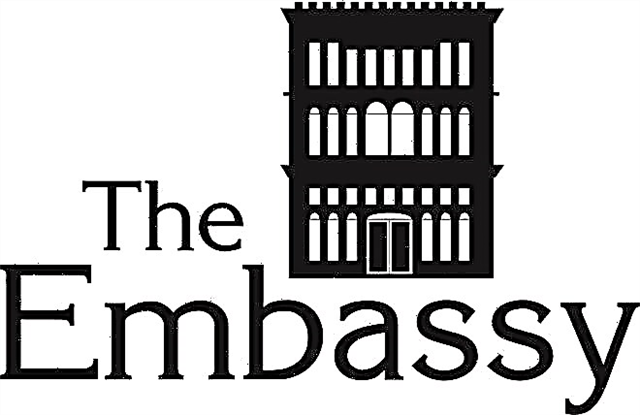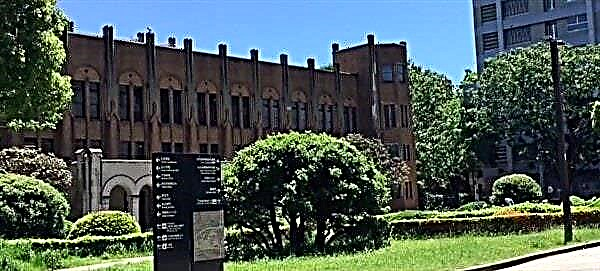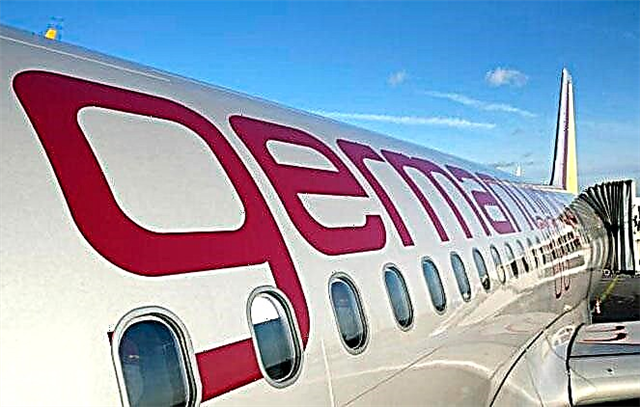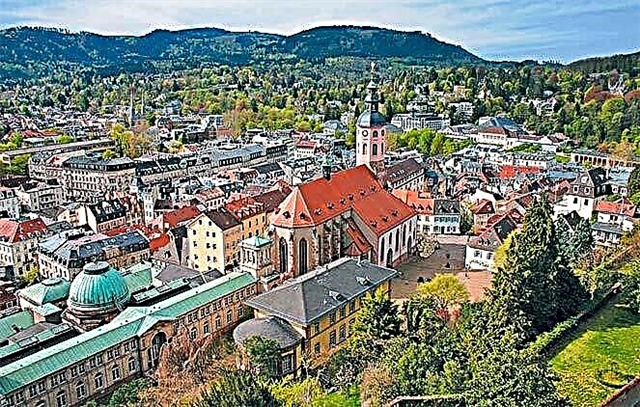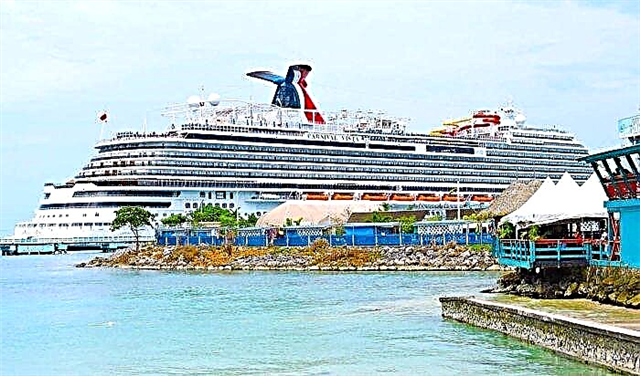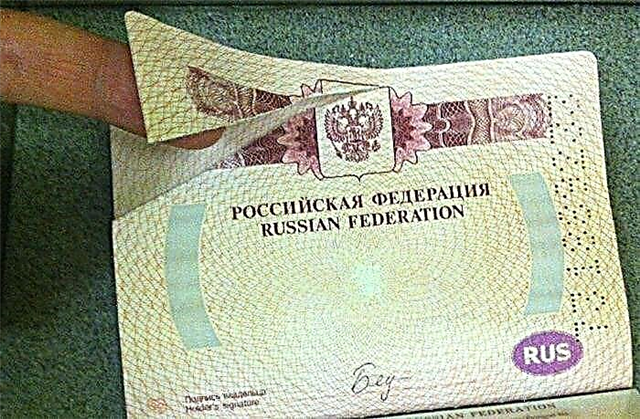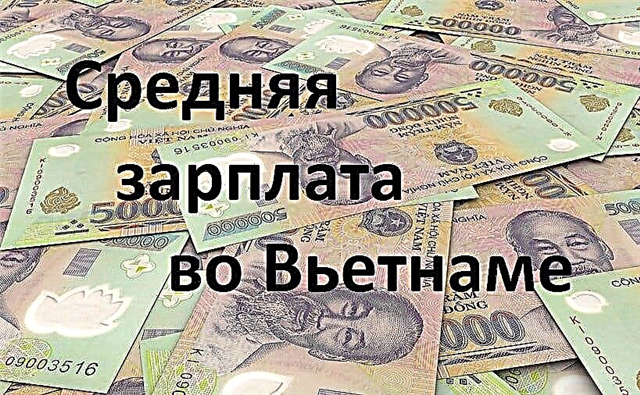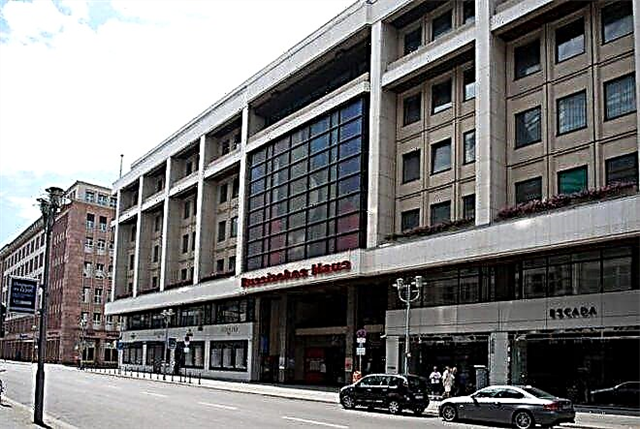The Russian House in Berlin is the largest Russian cultural institution in the world. Its building occupies almost an entire block. About 200 thousand people annually participate in various programs of this center. The organization plays a key role in the development of Russian-German humanitarian cooperation.

History of creation
The history of the RDNK (Russian House of Science and Culture) began during the division of Germany. Construction work started in 1981 and was carried out with the support of the GDR authorities.
Three years later, a seven-story building with an area of 29 thousand square meters appeared on one of the main streets of East Berlin. The center began to be called the House of Soviet Science and Culture. The official opening took place on July 5, 1984.
The building was designed by the German architect Karl-Ernst Svora. In the finishing process, precious materials such as Lusatian granite and Bulgarian sandstone were used. The architect was guided by the design solutions of representative buildings in Moscow of the Brezhnev era - the ITAR-TASS press center, the USSR Academy of Sciences and the White House.
Since the times of the Soviet Union and until now, the activities of the Russian House have been aimed at strengthening international cultural and humanitarian ties and popularizing the Russian language. After the collapse of the USSR, the complex became the property of Russia.
Library and Museum
The library is located on the fourth floor. To get acquainted with the funds, you must purchase a subscription. The library archives are:
- more than 20 thousand books;
- periodicals;
- audio materials on CD;
- video materials on DVD.
Mostly Russian-language editions are presented here, but there are also works in English and German.
Visitors can subscribe to 19 magazines and newspapers published in Germany and Russia, purchase new literature. Also open access to the project "Liters: Library", which provides an opportunity to read Russian-language news on electronic devices.
The library has a virtual branch of the Russian Museum, where you can visit a virtual tour of the palaces of the famous museum. It allows you to get acquainted with the reconstruction of old interiors and feel like a participant in the events depicted.
RDNK actively cooperates with well-known Russian museums, including the State Museum of Alexander Pushkin.
The presence of special exhibition spaces facilitates the regular holding of thematic exhibitions. Thus, in cooperation with the mentioned literary museum, the exhibition "Muses and Ranks" was held, dedicated to Russian writers who distinguished themselves in the public service.
Studios and clubs
The Russian House of Culture and Science offers a variety of leisure options. The center employs:
- children's art studio (studio of fine arts);
- studio of the puppeteer Irina Malyukova;
- chess Club;
- theatre studio;
- club of philatelists;
- music studio (early musical development, piano lessons, vocals, choreography);
- aerobics studio;
- ballet studio;
- school of art history.
RDNK organizes presentations, scientific seminars, music festivals, performances, film screenings, performances by Russian cultural figures, art and photo exhibitions.
Russian language courses
The courses operate on the basis of the Russian Language Center and are aimed at different audiences: sets are being opened both for a special program for children and for refresher courses. Children have the opportunity to master the program that Russian schoolchildren follow. There are also separate courses in business communication, spoken Russian and culture of speech.
In the RDNK, foreigners can be tested for their knowledge of the Russian language and receive a state-recognized certificate.
In this direction, the Russian House cooperates with leading Russian universities: Lomonosov Moscow State University, HSE, RUDN and the A. Gorky Literary Institute.
Compatriots' organizations
The Russian House in Berlin is the foreign representative office of Rossotrudnichestvo. The center has branches of various organizations of compatriots, which include:
- World Coordinating Council of Russian Compatriots;
- The All-German Coordination Council of Russian Compatriots;
- Association of Graduates of Moscow and Voronezh Universities;
- Foundation "West-Eastern Meetings";
- Society of Russian-speaking teachers and parents "Mitra";
- Society "Berlin Friends of the Peoples of Russia";
- Federal Union of German West-East Societies.
The Russian House maintains contacts with numerous organizations that participate in the development of the Russian-German humanitarian dialogue.
Opening hours and ticket prices
The RDNA is open daily from 9.00 to 20.00. The ticket office is open from 10.00 to 19.00. Opening hours are subject to change, so be sure to check the official website before visiting.
Up-to-date information is always available in the "Ticket Office" section. Free and paid events are held at the Russian House. The cost of visiting is published on the page of the tour, festival or film screening in the "Events" section. Free excursions are organized on the territory of the complex at least once a month.
How to get there
Address: Friedrichstraße 176-179, 10117 Berlin.
The Russian House of Culture and Science is located on Friedrichstrasse, a street in the center of Berlin that runs through the Kreuzberg and Mitte districts. The street is considered the German version of the Champs Elysees, so getting here is easy.
RDNK is located in the northern part of Friedrichstrasse, opposite the multi-storey shopping complex Friedrichstadt-Passage.
Berlin has two airports where planes arrive from Russia - Berlin Tegel (TXL) and Berlin Schönefeld (SXF). Buses X9, 109 and 128 run from Tegel Airport to the center of Berlin at intervals of 5 minutes. Express trains run from Schönefeld Airport (surface - S-Bahn, underground - U-Bahn). Friedrichstrasse can be reached with the S49 and S9 trains.
Outcomes
In terms of the scale of its activities, the Russian House in Germany is confidently ahead of all the operating representative offices of Rossotrudnichestvo abroad, of which there are 96 in different countries of the world. The German Center plays a huge role not only in acquainting foreign citizens with the culture and social life of Russia, but also in preserving the national identity of Russians. living abroad.

